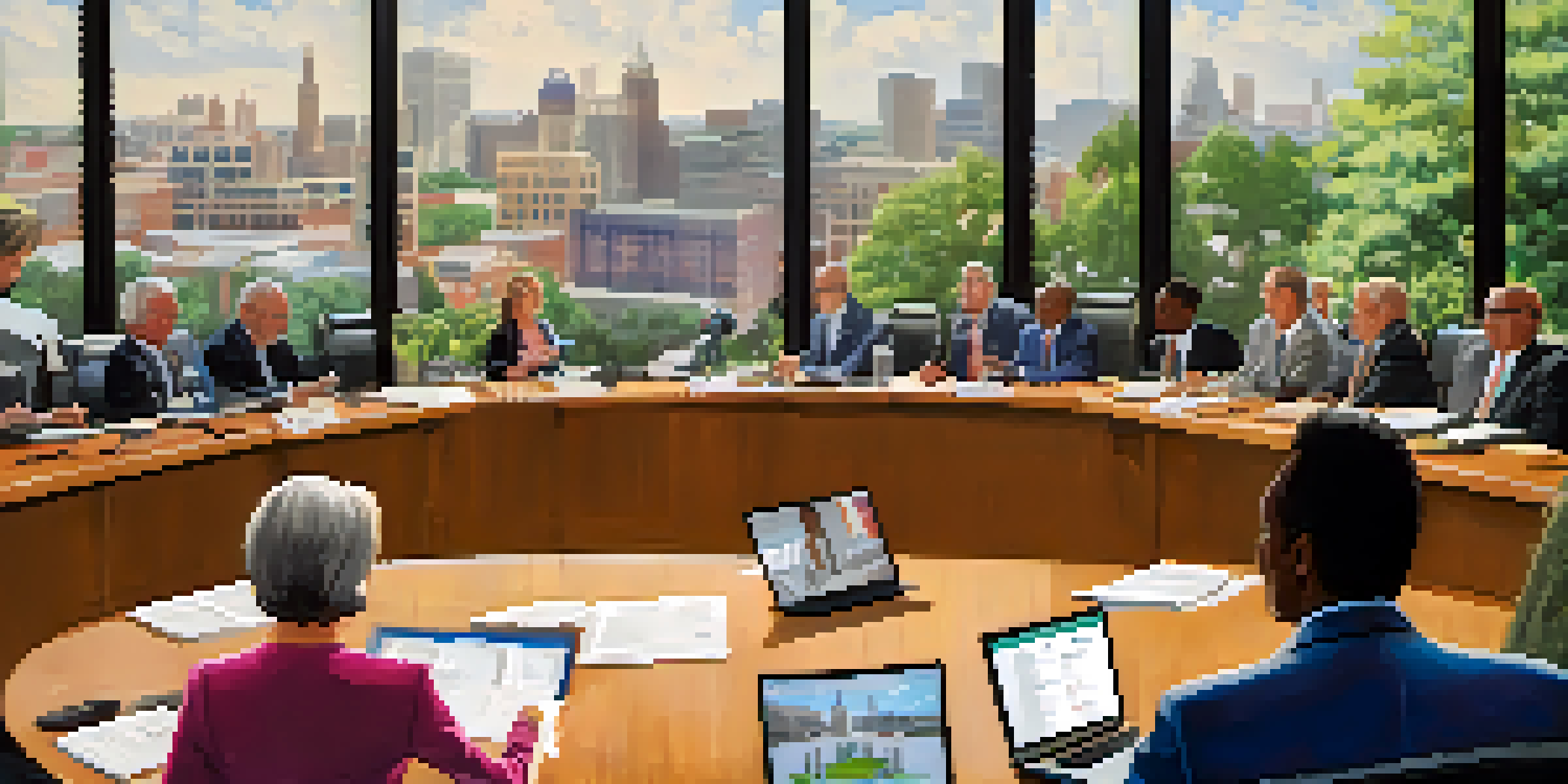Understanding Raleigh's Local Government Structure and Functions

Overview of Raleigh's Local Government Framework
Raleigh's local government operates under a council-manager system, which is designed to streamline decision-making. This structure allows elected officials to focus on policy while a city manager handles daily operations. The combination of elected representatives and professional management ensures that diverse community needs are met effectively.
A community is like a ship; everyone ought to be prepared to take the helm.
At the heart of this system is the City Council, made up of the Mayor and eight council members. They are responsible for setting city policies, approving budgets, and representing the interests of their constituents. This elected body works closely with the city manager to implement their vision for Raleigh's growth and development.
Understanding this framework is crucial for residents, as it directly impacts local services like public safety, parks, and infrastructure. By knowing who to contact or how decisions are made, citizens can engage more actively in their community.
Roles and Responsibilities of the City Council
The City Council plays a pivotal role in shaping Raleigh's future, with responsibilities that extend beyond mere legislation. Council members advocate for their districts, ensuring that local concerns are voiced and addressed. They also partake in numerous committees that oversee specific areas such as finance, public works, and community development.

In addition to policy-making, the council also approves the city budget, which outlines how public funds are allocated. This financial oversight is crucial, as it determines funding for essential services like education, transportation, and emergency services. Through public hearings and discussions, the council gathers community input to guide their budgetary decisions.
Council-Manager System Explained
Raleigh's local government utilizes a council-manager system to effectively balance policy-making and daily operations.
Moreover, the council's decisions can have long-term impacts on Raleigh's growth. For example, zoning laws, housing developments, and environmental regulations are all influenced by council actions, making their role integral to the city's overall planning and progress.
The Role of the City Manager in Raleigh
The city manager serves as the chief executive officer of Raleigh, tasked with implementing the policies set by the City Council. This role involves overseeing daily operations, managing city staff, and ensuring that services are delivered efficiently. The city manager acts as a bridge between the elected officials and the public, translating the council's vision into actionable plans.
The best way to predict the future is to create it.
One key responsibility of the city manager is preparing the annual budget, which requires a thorough understanding of community needs and available resources. By collaborating with department heads, the manager ensures that funds are allocated effectively to meet the city's goals. This process is not just about numbers; it's about prioritizing services that enhance residents' quality of life.
Raleigh's city manager also plays a critical role in crisis management and disaster response. Whether it’s coordinating emergency services during a storm or addressing public health issues, the city manager must be prepared to act swiftly and decisively to protect the community.
Understanding Raleigh's Departmental Structure
Raleigh's local government comprises various departments, each responsible for specific functions that keep the city running smoothly. These departments range from public safety, such as police and fire services, to public works, which manages infrastructure and maintenance. Each department works under the guidance of a director who reports to the city manager, ensuring that policies are effectively executed.
For example, the Parks and Recreation Department focuses on providing recreational opportunities and maintaining public spaces. Their work not only contributes to the aesthetic appeal of Raleigh but also promotes community engagement and well-being. Similarly, the Department of Transportation works on improving traffic flow and public transit, crucial for a growing city.
Community Engagement is Key
Active community engagement allows Raleigh residents to influence local governance and decision-making processes.
Each department plays a vital role in the overall governance of Raleigh, and understanding their functions can help residents access city services more effectively. Whether you need to report a pothole or inquire about recreational programs, knowing which department to contact makes the process smoother.
Community Engagement in Raleigh's Governance
Community engagement is a cornerstone of Raleigh's governance, as local officials actively seek input from residents. This engagement takes many forms, including public forums, town hall meetings, and surveys. By encouraging participation, the city ensures that diverse voices are heard in decision-making processes.
One effective way Raleigh fosters engagement is through advisory boards and commissions, which allow residents to contribute their expertise on various topics. These boards cover areas such as environmental issues, urban design, and public health, providing a platform for citizens to influence local policies directly. This collaborative approach not only enriches discussions but also builds trust between the community and government.
Additionally, the city utilizes online platforms to disseminate information and gather feedback, making participation accessible to a broader audience. As a result, community engagement helps Raleigh's local government become more responsive and accountable to its residents.
The Importance of Transparency in Local Government
Transparency is vital for fostering trust between Raleigh's local government and its citizens. By making information readily available, the city empowers residents to stay informed about policies, budgets, and decision-making processes. This openness not only enhances civic engagement but also holds officials accountable for their actions.
Raleigh promotes transparency through various means, including public access to council meetings, detailed budget reports, and open data initiatives. These efforts allow residents to understand how their tax dollars are being spent and the rationale behind major decisions. Such accessibility is crucial in a democratic system, as it encourages informed discussions and community participation.
Transparency Builds Trust
Raleigh promotes transparency to empower residents and enhance accountability within local government.
Moreover, transparency can lead to improved governance, as it encourages officials to consider public opinion before making decisions. This collaborative environment ultimately results in policies that better reflect the community's needs and values.
Future Challenges Facing Raleigh's Local Government
As Raleigh continues to grow, its local government faces a myriad of challenges that require innovative solutions. Rapid population growth brings increased demand for housing, transportation, and public services, putting pressure on existing infrastructure. Balancing development while preserving the city's unique character is a significant challenge that requires thoughtful planning.
Additionally, issues such as climate change and economic disparities present hurdles that the local government must address. Ensuring sustainable practices and equitable access to resources are essential for fostering a resilient community. This often involves collaboration with various stakeholders, including businesses, non-profits, and residents.

Looking to the future, Raleigh's local government will need to adapt and evolve to meet these challenges head-on. By embracing new technologies, engaging the community, and prioritizing transparency, Raleigh can continue to thrive as a vibrant and inclusive city.